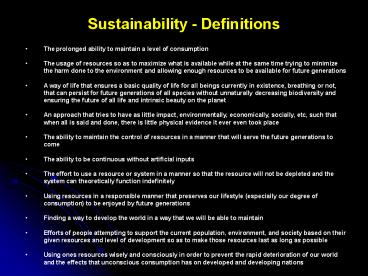Sustainability - Definitions - PowerPoint PPT Presentation
Title:
Sustainability - Definitions
Description:
A way of life that ensures a basic quality of life ... unnaturally decreasing biodiversity and ensuring the future ... whole concept of sacred grove is ... – PowerPoint PPT presentation
Number of Views:85
Avg rating:3.0/5.0
Title: Sustainability - Definitions
1
- Sustainability - Definitions
- The prolonged ability to maintain a level of
consumption - The usage of resources so as to maximize what is
available while at the same time trying to
minimize the harm done to the environment and
allowing enough resources to be available for
future generations - A way of life that ensures a basic quality of
life for all beings currently in existence,
breathing or not, that can persist for future
generations of all species without unnaturally
decreasing biodiversity and ensuring the future
of all life and intrinsic beauty on the planet - An approach that tries to have as little impact,
environmentally, economically, socially, etc,
such that when all is said and done, there is
little physical evidence it ever even took place - The ability to maintain the control of resources
in a manner that will serve the future
generations to come - The ability to be continuous without artificial
inputs - The effort to use a resource or system in a
manner so that the resource will not be depleted
and the system can theoretically function
indefinitely - Using resources in a responsible manner that
preserves our lifestyle (especially our degree of
consumption) to be enjoyed by future generations - Finding a way to develop the world in a way that
we will be able to maintain - Efforts of people attempting to support the
current population, environment, and society
based on their given resources and level of
development so as to make those resources last as
long as possible
2
The Christian Worldview, per White
- Place and role of God
- Place and role of humanity
- Place and role of nature
- Vision of time and history
3
What people do about their ecology depends on
what they think about themselves in relation to
things around them. Human ecology is deeply
conditioned by beliefs about our nature and
destinythat is, by religion. --Lynn White, p.
1205
4
The victory of Christianity over paganism was the
greatest psychic revolution in the history of our
culture. --Lynn White, p. 1205
5
The whole concept of sacred grove is alien to
Christianity and the ethos of the West. For
nearly two millennia Christian missionaries have
been chopping down sacred groves because they
assume spirit in nature. --Lynn White, p. 1206
6
Our daily habits of action . . . are dominated by
an implicit faith in human perpetual progress
which was unknown either to Greco-Roman antiquity
or to the Orient. It is rooted in, and is
indefensible apart from, Judeo-Christian
teleology. --Lynn White, p. 1205
7
The Christian Worldview, per White
- Place and role of God
- Place and role of humanity
- Place and role of nature
- Vision of time and history
8
- How might Lynn Whites
- argument be reconstructed?
9
10
- Todays ecologic crisis (at least in 1967) is
caused by large-scale human impacts driven by
modern science and technology (MST). - MST arose during the Europes Scientific
Revolution beginning in the 15th and 16th
centuries. - By the end of the 15th century the small,
mutually hostile Christian nations of Europe had
begun spilling out all over the world conquering,
looting, and colonizing much of the planet by
using MST. - The presuppositions underlying MST stem from the
history of Christianity. - Pagan animism was generally friendly toward
nature and employed various constraints on the
alternation of nature. The destruction of pagan
animism by Christianity during the transition
from the Medieval Period to the rise of MST ended
these constraints. - Ending these restraints was driven by a Western
Roman Empire Tradition (WRET) of Christianity in
which salvation was found through right conduct
and by conquering nature. - This WRET stemmed from Christianitys radical
anthropocentrism, its dualism of humans and
nature, and Gods commands to control, exploit,
and dominate nature. - Therefore, our ecologic crisis is caused by
Christianity. Since the roots of our trouble
are so largely religious, the remedy must also be
essentially religious and not merely scientific
or technological. Rethinking Christianity is
essential to solving our environmental problems
and ecologic crisis.
11
The Tragedy of the Commons by Garrett Hardin
(1968)
- What precisely is Hardins argument?
- How can you reconstruct it?
- And is it a good argument?































